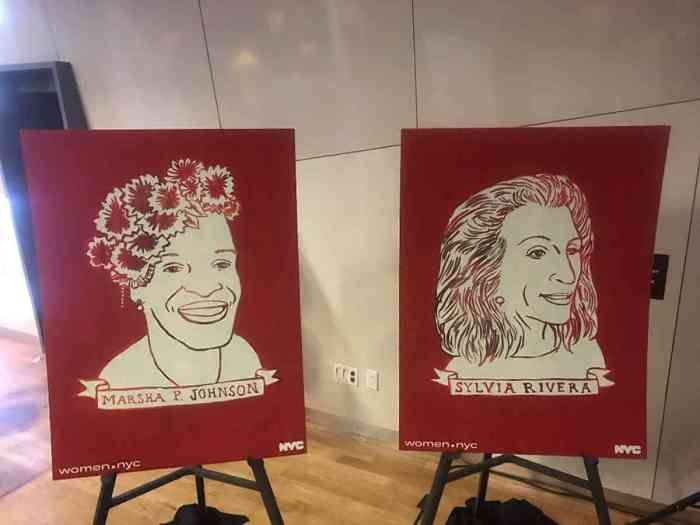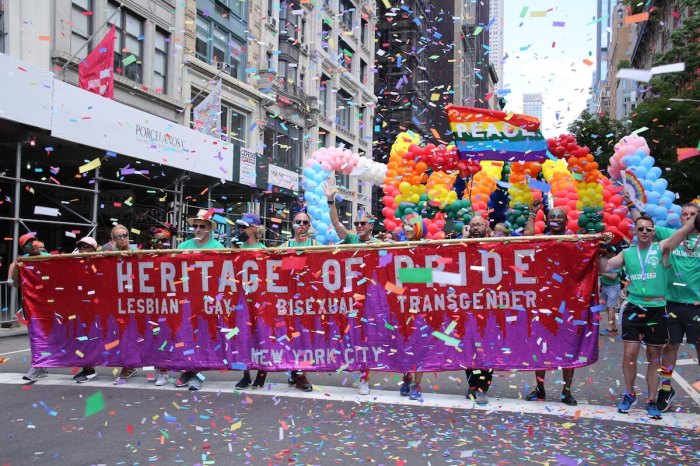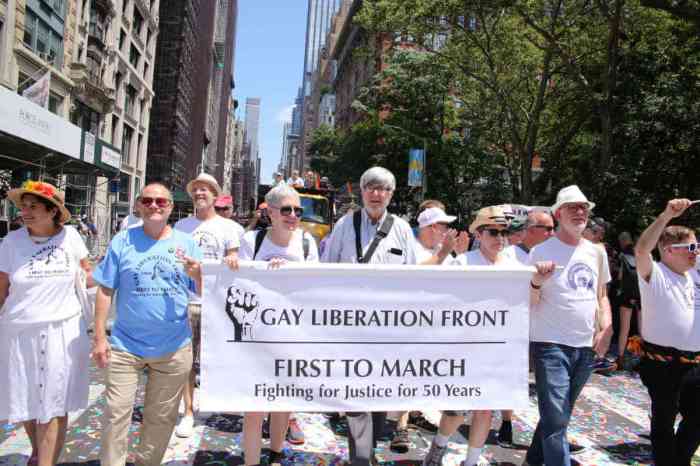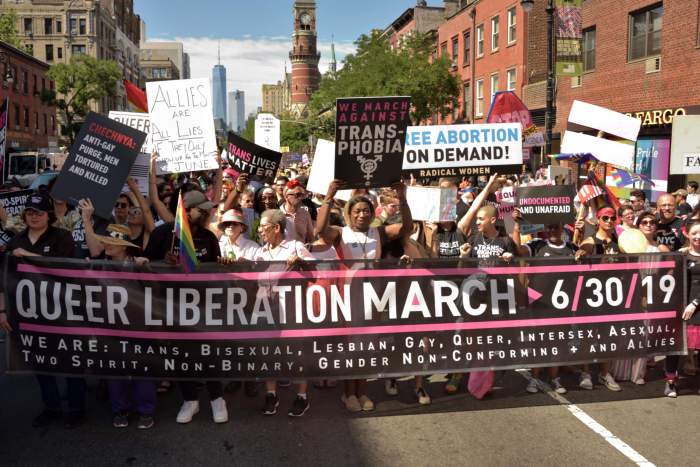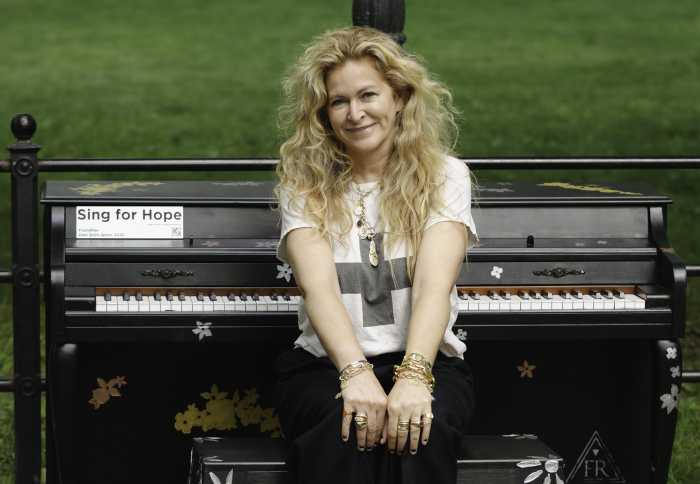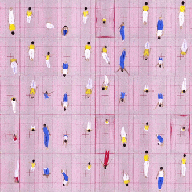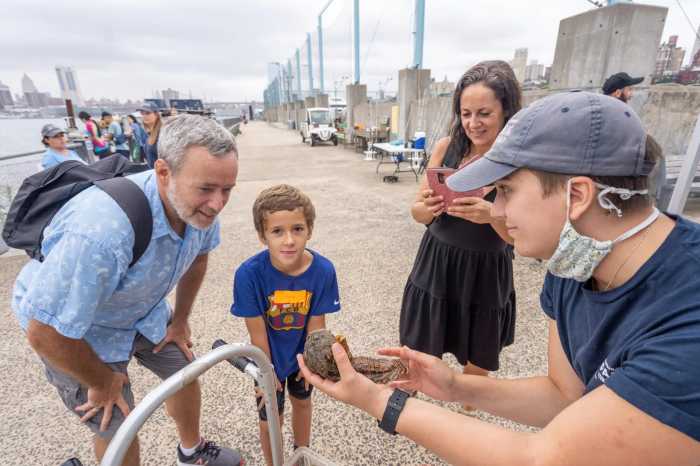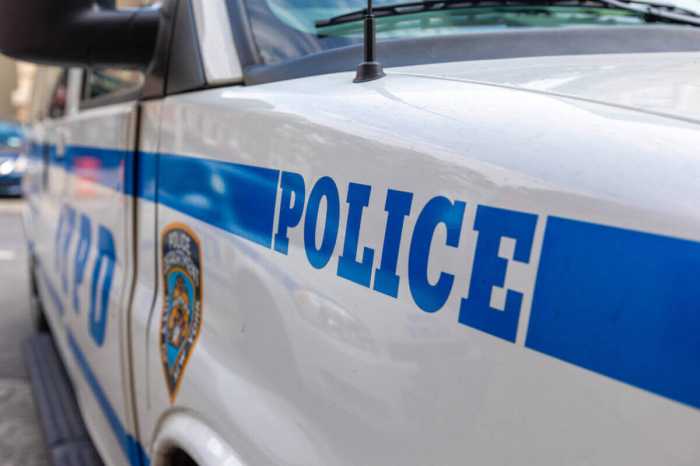Marchers in this year's LGBT Pride Parade march past the Stonewall Inn as they celebrate the victories over DOMA and Proposition 8 at the US Supreme Court. | MICHAEL LUONGO
The private Historic Landmarks Preservation Center (HLPC) will “commemorate the Stonewall Inn and the Stonewall Rebellion” on Tuesday, July 16 at 3 p.m. outside the bar, but the plaque created for the occasion was not reviewed by anyone who participated in the June 1969 uprising nor were any of its veterans invited to speak.
“It’s outrageous and unacceptable,” said Jerry Hoose, the veteran gay activist who “fought every night in the riots –– all four from beginning to end.”
Hoose added, “I’m so tired of that bar being glorified. It was this horrendous place where something great happened. I’d like a plaque where we had the first GLF [Gay Liberation Front, formed in the wake of Stonewall] meeting at Alternate U. on 14th and Sixth.”
Vets of '69 rebellion say Stonewall spirit was in the streets, not the bar
The idea for a plaque at the Stonewall came from out gay State Senator Brad Hoylman, who represents the Village area where the uprising took place.
“It was obvious to me and others that you could walk right by the site of the rebellion and not know it happened there,” he said.
He explained, however, that after making the suggestion to the HLPC, he was not involved in planning the event. According to a release from the group, Hoylman has been asked to read a poem “written for this occasion” by Maureen McLane of NYU’s English Department.
Asked about the omission of Stonewall veterans, Hoylman said, “I’m hopeful there are veterans of the rebellion present. I hope they have an opportunity to speak.”
Artist Tommy Lanigan-Schmidt, a prominent veteran of the Stonewall Rebellion, said Hoylman reached out to him on Monday to be at the ceremony and that he would go but was not sure how he would participate.
“I'll play it by ear,” he said. “The ongoing process of things being rewritten or made up [about Stonewall] bothers me. They totally leave out the class element, which is a major component.”
The other speakers listed in the release are Jordan Roth, an out gay Broadway producer and NYC Landmarks50 Advisory Committee member; Roberta Kaplan , who successfully argued the challenge to the Defense of Marriage Act’s denial of federal rights to married same-sex couples; Richard Socarides, a White House aide to President Bill Clinton, who signed DOMA into law in 1996; and historian Martin Duberman, who wrote a 1993 book on the rebellion called “Stonewall.”
None were at Stonewall for the uprising.
Duberman said he was asked to review the text for the plaque but, noting that was some time ago, said he does not recall the precise language.
The HLPC’s “cultural medallion program” was started 15 years ago –– mostly to mark places where prominent individuals lived –– by a wealthy Democratic fundraiser, Barbaralee Diamonstein-Spielvogel, a former member of the New York City Landmarks Preservation Commission, who served on that body longer than anyone else ever has. Reached by phone, she refused to discuss the event in advance of it or explain why Stonewall veterans were not invited to speak or involved in preparing the plaque’s text.
David Carter, author of the 2005 “Stonewall: The Riots that Sparked the Gay Revolution” that was turned into a PBS-TV documentary, “Stonewall Uprising,” was also not consulted about the plaque or ceremony. He worked on a grant from the Greenwich Village Society for Historic Preservation in 1998 to “research the history of the Stonewall Inn and Stonewall Uprising as a basis of an application to place the inn, surrounding streets and sidewalks, and Christopher Park [across the street] on the National Register of Historic Places,” he said. “We got that in 1999, the first time that a site had been placed on the registry solely because of its role in LGBT civil rights history. The same research was used a year later to try to get it listed as a National Historic Landmark and that succeeded. I like to tell people it has the same designation as the Statue of Liberty, Mount Vernon, and Valley Forge.”
But there is no plaque indicating that the area is on these historic lists because the federal government does not do that for private buildings. Carter is hopeful the new plaque will list those designations, but the organizers of the event would not share the text in advance.
Carter also noted that the Parks Department has a sign in Christopher Park that accompanies George Segal’s sculpture “Gay Liberation” featuring a male couple and a female couple –– created in 1980 but not installed until 1992 –– that recounts some of the uprising’s history. Those statues were protested when first created as being unrepresentative of the multi-racial, multi-sexual uprising, especially by Craig Rodwell, the original owner of the Oscar Wilde Bookshop –– located for decades just down the street –– who in 1970 co-founded the Christopher Street Liberation Day March that is today called the LGBT Pride Parade. (Full disclosure: I worked peripherally with a group led by the late Bruce Voeller, a co-founder of the National Gay and Lesbian Task Force, that pushed Mayor David Dinkins to okay the statues’ location in the park.)
The area in front of the Stonewall was dedicated as “Stonewall Place” in 1989 by Mayor Ed Koch in the midst of his unsuccessful run for a fourth term, an event I covered as a reporter. Koch was besieged by angry members of ACT UP holding up placards that looked like tombstones attacking his failed AIDS policies. Duberman was standing next to him as the second scheduled speaker and after the mayor fled the platform, unable to be heard above the din of protests, Duberman told the crowd, he recalled this week, “I take no pleasure in sharing a platform with Ed Koch.”
Jim Fouratt, one of the original members of GLF, wrote in an email, “I do not consider the Stonewall Inn a symbol of liberation but one of oppression. It remains in the same ‘family’ that it did in 1969… What needs to be memorialized is the sidewalk and part of Christopher St. that contained the human spark that made a rebellion that has fundamentally changed the lives of lesbian and gay people of all gender expression everywhere.”
In her poem for the occasion, “Stonewall,” McLane, the author of three books of poems, begins, “Let this medallion stand/ for nothing planned” and says the rebellion was “a spontaneous paroxysm/ a cataclysm of visibility.”



